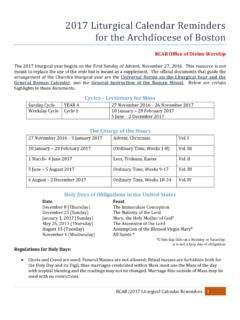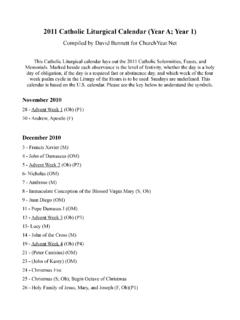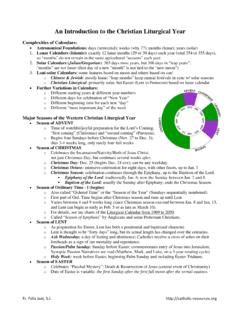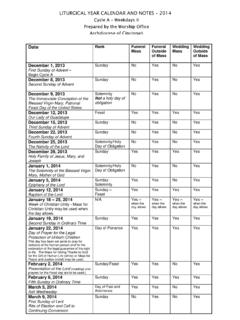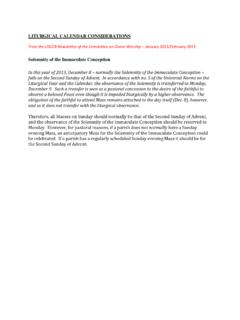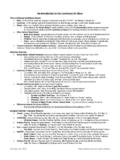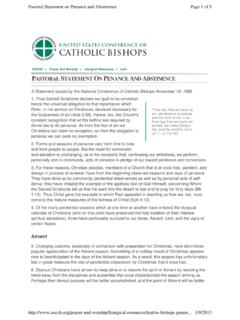Transcription of Sing to the Lord - yakimadiocese.org
1 Issued by usccb , November 14, 2007 Copyright 2007, united states conference of catholic bishops . All rights to the lord :Music in Divine WorshipCONTENTSA bbreviationsForewordI. WHY WE SINGP articipationII. THE CHURCH AT Gathered liturgical AssemblyE. Ministers of liturgical MusicThe ChoirThe PsalmistThe CantorThe Organist and Other InstrumentalistsThe Director of Music and in catholic Cultures and in the LiturgyIII. THE MUSIC OF catholic Kinds of Music for the LiturgyMusic for the Sacred LiturgyGregorian ChantThe Composer and Music of Our Human VoiceMusical InstrumentsInstrumental MusicRecorded of Musicians and Their Copyrights and Participation AidsIV. PREPARING MUSIC FOR catholic WORSHIPA. What Parts Do We Sing?The Principle of Progressive SolemnityThe Parts to Be SungSacred SilenceB. Who Prepares the Music for the Liturgy?C. Care in the Choice of Music for the LiturgyD. Judging the Qualities of Music for the LiturgyThe Three Judgments: One EvaluationThe liturgical JudgmentThe Pastoral JudgmentThe Musical JudgmentV.
2 THE MUSICAL STRUCTURE OF catholic WORSHIPA. Music and the Structure of the MassThe Introductory RitesThe Liturgy of the WordThe Liturgy of the EucharistThe Communion RiteThe Concluding RitesB. Music and the Other SacramentsThe Sacraments of InitiationThe Initiation of AdultsThe Baptism of ChildrenThe Baptism of Children During Sunday MassThe Sacrament of ConfirmationThe Rite of MarriageThe Rite of OrdinationThe Sacrament of Anointing of the SickThe Sacrament of PenanceC. Music and the Liturgy of the HoursResponsorialAntiphonalThrough-Compo sedMetrical PsalmsFormula TonesOther ElementsD. Other liturgical RitesSunday Celebrations in the Absence of a PriestWorship of the Eucharist Outside MassOrder of Christian FuneralsE. DevotionsVI. CONCLUSIONA bbreviationsAGSecond Vatican Council, Ad Gentes Divinitus (Decree on the Church sMissionary Activity) (1965)BCLB ishops Committee on the LiturgyBLSUSCCB, Built of Living Stones: Art, Architecture, and Worship (2000)CCCC atechism of the catholic Church, 2nd editionCVL usccb , Co-Workers in the Vineyard of the lord .
3 A Resource for Guiding theDevelopment of Lay Ecclesial Ministry (2005)DVSecond Vatican Council, Dei Verbum (Dogmatic Constitution on DivineRevelation) (1965)GILHG eneral Instruction of the Liturgy of the HoursGIRMG eneral Instruction of the Roman MissalGSSecond Vatican Council, Gaudium et Spes (Pastoral Constitution on the Churchin the Modern World) (1965)HCWEOMHoly Communion and Worship of the Eucharist Outside MassLFML ectionary for MassLTAJohn Paul II, Letter to Artists (1999)MSSacred Congregation for Rites, Musicam Sacram (Instruction on Music in theLiturgy) (1967)MSDPius XII, Musicae Sacrae Disciplina (On Sacred Music) (1955)OCFO rder of Christian FuneralsORDR ites of Ordination of a Bishop, of Priests, and of Deacons, 2nd typical editionPCSP astoral Care of the SickPLPatrologiae cursus completes: Series LatinaRBCRite of Baptism of ChildrenRCRite of ConfirmationRCIARite of Christian Initiation of AdultsRMRite of MarriageSacCarBenedict XVI, Sacramentum Caritatis (Sacrament of Charity) (2007)SCSecond Vatican Council, Sacrosanctum Concilium (Constitution on the SacredLiturgy) (1963)USCCBU nited states conference of catholic BishopsSing to the lord : Music in Divine Worship, a revision of Music in catholic Worship, wasdeveloped by the Committee on Divine Worship of the united states conference of CatholicBishops ( usccb ).
4 On November 14, 2007, the Latin Church members of the usccb approvedthese guidelines. These guidelines are designed to provide direction to those preparing for thecelebration of the Sacred Liturgy according to the current liturgical books (in the ordinary formof celebration).ForewordGreetings from the bishops of the united states to priests, deacons, liturgists, musicdirectors, composers, cantors, choirs, congregations, and faith communities throughout theUnited states . Grace to you and peace from God our Father and the lord Jesus Christ. 1 It isour duty and our joy as shepherds of the Church to guide and oversee liturgical song in eachparticular Church. Liturgy is the source of the Church s prayer and action, and the summit bywhich our lives and all our ministries ascend to the Father. We pray that this document will drawall who worship the lord into the fullness of liturgical , musical prayer. 1 Eph 1 WHY WE SING1. God has bestowed upon his people the gift of song.
5 God dwells within each humanperson, in the place where music takes its source. Indeed, God, the giver of song, is presentwhenever his people sing his A cry from deep within our being, music is a way for God to lead us to the realm ofhigher As St. Augustine says, Singing is for the one who loves. 4 Music is therefore asign of God s love for us and of our love for him. In this sense, it is very personal. But unlessmusic sounds, it is not music, and whenever it sounds, it is accessible to others. By its verynature song has both an individual and a communal dimension. Thus, it is no wonder that singingtogether in church expresses so well the sacramental presence of God to his Our ancestors reveled in this gift, sometimes with God s urging. Write out this song,then, for yourselves, God said to Moses. Teach it to the Israelites and have them recite it, sothat this song may be a witness for me. 5 The Chosen People, after they passed through the RedSea, sang as one to the Deborah, a judge of Israel, sang to the lord with Barak after Godgave them David and the Israelites made merry before the lord with all their strength,with singing and with citharas, harps, tambourines, sistrums and cymbals.
6 8 2 Do you not know that you are the temple of God, and that the Spirit of God dwells in you? If anyonedestroys God s temple, God will destroy that person; for the temple of God, which you are, is holy (1 Cor3:16-17).3 See St. Augustine, Epis. 161, De origine animae hominis, 1, 2; PL XXXIII, 725, as quoted in Pope PiusXII, Encyclical On Sacred Music (Musicae Sacrae Disciplina) (MSD), no. 5, St. Augustine, Sermo 336, 1 (PL 1844-1855, 38, 1472).5 Dt 31 Ex 15:1-18, Jgs 4:4 5 2 Sm 6 Jesus and his apostles sang a hymn before their journey to the Mount of instructed the Ephesians to [address] one another in psalms and hymns and spiritual songs,singing and playing to the lord in your hearts. 10 He sang with Silas in The letter ofSt. James asks, Is anyone among you suffering? He should pray. Is anyone in good spirits? Heshould sing praise. 125. Obedient to Christ and to the Church, we gather in liturgical assembly, week afterweek.
7 As our predecessors did, we find ourselves singing psalms, hymns and spiritual songswith gratitude in [our] hearts to God. 13 This common, sung expression of faith within liturgicalcelebrations strengthens our faith when it grows weak and draws us into the divinely inspiredvoice of the Church at prayer. Faith grows when it is well expressed in celebration. Goodcelebrations can foster and nourish faith. Poor celebrations may weaken it. Good music make[s]the liturgical prayers of the Christian community more alive and fervent so that everyone canpraise and beseech the Triune God more powerfully, more intently and more effectively. 146. In human life, signs and symbols occupy an important place. As a being at once bodyand spirit, man expresses and perceives spiritual realities through physical signs and symbols..Inasmuch as they are creatures, these perceptible realities can become means of expressing theaction of God who sanctifies men, and the action of men who offer worship to God.
8 15 Thissacramental principle is the consistent belief of the Church throughout history. In Liturgy, we use 9 Mt 26:30; Mk 14 Eph 5 About midnight .. Paul and Silas were praying and singing hymns to God, as the other prisonerslistened (Acts 16:25)12 Jas 5 Col 3:16; see General Instruction of the Roman Missal (GIRM), no. 39 (Washington, DC: united StatesConference of catholic bishops [ usccb ], 2003). See Eph 5 MSD, no. 31; see no. Catechism of the catholic Church (CCC), 2nd ed., nos. 1146, 1148 (Washington, DC: Libreria EditriceVaticana usccb , 2000).words, gestures, signs, and symbols to proclaim Christ s presence and to reply with our worshipand The primordial song of the Liturgy is the canticle of victory over sin and death. It is thesong of the saints, standing beside the sea of glass : They were holding God s harps, and theysang the song of Moses, the servant of God, and the song of the Lamb. 16 liturgical singing isestablished in the midst of this great historical tension.
9 For Israel, the event of salvation in theRed Sea will always be the main reason for praising God, the basic theme of the songs it singsbefore God. For Christians, the Resurrection of Christ is the true Exodus.. The definitivelynew song has been intoned.. 178. The Paschal hymn, of course, does not cease when a liturgical celebration ends. Christ,whose praises we have sung, remains with us and leads us through church doors to the wholeworld, with its joys and hopes, griefs and The words Jesus chose from the book ofIsaiah at the beginning of his ministry become the song of the Body of Christ. The Spirit of theLord is upon me, because he has anointed me to bring glad tidings to the poor. He has sent me toproclaim liberty to captives and recovery of sight to the blind, to let the oppressed go free, and toproclaim a year acceptable to the lord . 199. Charity, justice, and evangelization are thus the normal consequences of liturgicalcelebration. Particularly inspired by sung participation, the body of the Word Incarnate goesforth to spread the Gospel with full force and compassion.
10 In this way, the Church leads men andwomen to the faith, freedom and peace of Christ by the example of its life and teaching, by the 16 Rev 15 Cardinal Joseph Ratzinger, The Spirit of the Liturgy (Ignatius Press, 2000), See Second Vatican Council, Gaudium et Spes (Pastoral Constitution on the Church in the Modern World)(GS), no. 1, in Vatican Council II: The Conciliar and Post Conciliar Documents, new revised edition, Flannery, OP (Northport, NY: Costello Publishing, 1996). All subsequent Second Vatican Councilpassages come from the Flannery Lk 4:18; see Is 61:1-2, 58 and other means of grace. Its aim is to open up for all men a free and sure path to fullparticipation in the mystery of Christ. 20 Participation10. Holy Mother Church clearly affirms the role within worship of the entire liturgicalassembly (bishop, priest, deacon, acolytes, ministers of the Word, music leaders, choir,extraordinary ministers of Holy Communion, and the congregation).

